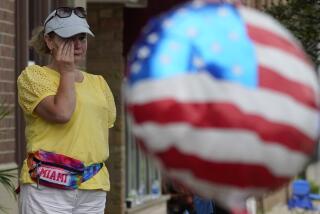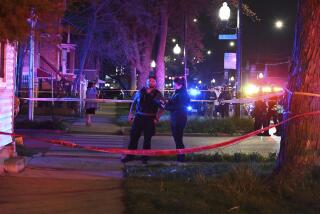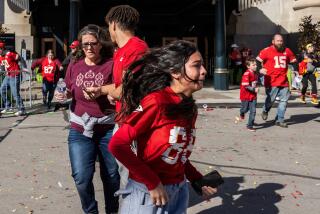Bloody Chicago weekend raises questions about guns, gangs and morals
No mass killer terrorized the Chicago streets on Easter weekend. But the joyous spring holiday of renewal was anything but tranquil.
At least nine people were killed and 36 others, including children, were shot and wounded. It was the second weekend in a row that at least 36 people were shot in Chicago.
No armor-clad gunman invaded a movie theater. No gunman went into an elementary school, killing 20 children and six educators. No white supremacist opened fire on places associated with Jewish activities.
Instead, the deadly toll in Chicago was the stuff out of which the piece-meal urban tragedy is made -- just more so.
Over the weekend, police reported deaths from typical blotter material:
There was an attempted car robbery, a domestic quarrel that turned into a murder-suicide involving armed law enforcement officials, a dispute that began with heated words on Facebook and a group of children in a playground as bullets flew from a car in which the gunman was looking for members of an opposing gang.
The five children shot in that incident, ranging from 11 to 15, were not even members of a gang, their relatives said. [Updated 12:11 p.m. PDT April 22: Through Sunday, at least 48 youths age 16 or younger have been shot in Chicago this year, a Chicago Tribune analysis found.]
“Every child deserves a childhood, regardless of where they live,” Mayor Rahm Emanuel told reporters. “But to do that, our city and community, the neighborhoods that make up this city, cannot live by a code of silence. They have to live by a moral code.”
The mayor dismissed one theory that crime increases as the weather warms because more people frolic outdoors. “Now I’ve read some of this,” Emanuel said, “and I just want to say this, when some people go: ‘Well, it’s the weather.’ It’s whether you have values.”
In addition to the values question -- whether schools and families are doing enough to instill a moral code in the young -- the latest wave of violence has sparked a renewal of questions about guns and gangs, both problems in many cities.
Police Supt. Garry McCarthy said a bloody holiday weekend doesn’t wipe out the gains the city has made in curbing gun violence. Chicago killings reached their high of 516 in 2012 -- the second time homicides surpassed 500 since 2003. Last year, the number of killings dropped to 415, the lowest total in the city in nearly half a century, according to government statistics.
“This doesn’t wipe out what has happened over the last two years, and this is a conversation that we’ve had time and time again,” McCarthy told reporters on Monday morning. “There’s no magic formula here. We have a plan, we have a strategy, and it’s hard work. That’s what it is.… It’s a day-by-day, minute-by-minute grind, and we’re into busy season. That’s what it is.”
The superintendent said the vast majority of shootings in Chicago are gang-related. But there is also the question of the availability of guns. For some, fewer legal guns would mean fewer shooting crimes. Opponents argue restrictions on weapons would violate constitutionally protected rights.
McCarthy repeatedly has urged state lawmakers to enact mandatory minimum sentences for repeat gun offenders. Such legislation is moving through the state legislative process with no guarantee of passage.
“We can do things to improve what’s happening, but until such time as we get some help with the gun laws in the state of Illinois, we’re up against it. We’re drinking from a fire hose,” McCarthy said.
[For the Record, 12:16 p.m. PDT April 22, 2014: An earlier version of this story misstated the number of dead children. Five children were shot and wounded, not killed, in one incident.]
More to Read
Sign up for Essential California
The most important California stories and recommendations in your inbox every morning.
You may occasionally receive promotional content from the Los Angeles Times.











